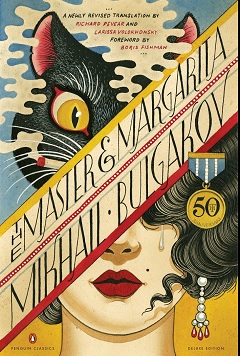Manuscripts Don't Burn
Heated up by a cold war
 I have a longtime fascination with Russian culture. The germination of my interest traces back to the Cold War, which pitted Americans (the “good guys”) against Soviets (nyet the “good guys”). I missed Sputnik and I don’t recall crawling under my desk to practice the “kiss my keister goodbye” incoming-nuclear-missile drill. I did watch our heroic Frosbite Falls duo foil Boris Badinoff and Natasha Fatale on black-and-white (in more ways than one) television, and I did watch our red-white-and-blue Olympians battle grim-faced, crewcut Soviets wearing across the chests of their proletarian red uniforms the enigmatic tetragrammaton “CCCP” (“cee-cee-cee-pee” to my twelve-year-old mind).
I have a longtime fascination with Russian culture. The germination of my interest traces back to the Cold War, which pitted Americans (the “good guys”) against Soviets (nyet the “good guys”). I missed Sputnik and I don’t recall crawling under my desk to practice the “kiss my keister goodbye” incoming-nuclear-missile drill. I did watch our heroic Frosbite Falls duo foil Boris Badinoff and Natasha Fatale on black-and-white (in more ways than one) television, and I did watch our red-white-and-blue Olympians battle grim-faced, crewcut Soviets wearing across the chests of their proletarian red uniforms the enigmatic tetragrammaton “CCCP” (“cee-cee-cee-pee” to my twelve-year-old mind).
Much later, at around the time I began monitoring the movements of Soviet submarines in the Pacific—not independently, but as a landlocked sailor in the US Navy—my interest turned into a nearly lifelong obsession with Russian history and culture. I could blah, blah, blah awhile longer about this acquired amateur russophile syndrome (AARS), but this would tedious for my hypothetical readership. It’s my love of Russian literature that is relevant here.
In contrast to my reading and re-reading of the giants of 19th century Russian literature—you know the names—my neglect of Soviet era, 20th-century authors is almost absolute. Of course I’ve read Pasternak’s novel—the prizewinning one that so impressed Nabokov.[1] I have read four or five of Nabokov’s novels, though I believe only one was written before he emigrated; he doesn’t count. The one Soviet-era writer whom I’ve read is the unquestionably heroic, though later revealed to be a bit of a crank, Aleksandr Solzhenitsyn. His most famous fictional work is the novella One Day in the Life of Ivan Denisovich, which was published inside the USSR during “de-Stalinization” in 1962. His novels Cancer Ward and The First Circle were written shortly after Denisovich, but were not approved for publication in his country. They circulated only in samizdat copies in the USSR before their 1968 appearances in the West.[2] I hadn’t read any other fiction from this time—until this past week. It’s very likely I’ve missed much!
One I missed
 Mikhail Bulgakov somehow escaped my notice entirely, and in particular I missed his unique and extraordinary The Master and Margarita (until now). The only thing this book has in common with Solzhenitsyn’s novels is that it couldn’t be published in the Soviet Union. Bulgakov finished it shortly before he died in 1940, put it a drawer, and left it to his wife to publish if it were ever possible. During the same brief thaw that saw the publication of Solzhenitsyn’s Denisovich, it finally appeared—albeit in a censored serialization—in a Soviet periodical[3]
Mikhail Bulgakov somehow escaped my notice entirely, and in particular I missed his unique and extraordinary The Master and Margarita (until now). The only thing this book has in common with Solzhenitsyn’s novels is that it couldn’t be published in the Soviet Union. Bulgakov finished it shortly before he died in 1940, put it a drawer, and left it to his wife to publish if it were ever possible. During the same brief thaw that saw the publication of Solzhenitsyn’s Denisovich, it finally appeared—albeit in a censored serialization—in a Soviet periodical[3]
Bulgakov’s masterpiece is a fantastical tale of Satan—in the guise of the black magician Woland—visiting officially atheist Moscow in the 1930s. Chaos ensues. Woland’s unforgettable companions; the Party elites including the oddly-named Berlioz, Rimsky, and Stravinsky[4]; the members of MASSOLIT (a sort of Soviet writers’ guild); the grifting and incompetent petty authorities: it’s a theatrical cast of bedeviled characters roiling with life. Throughout, Bulgakov alludes to Goethe’s Faust, and portrays the “atheist” Muscovites casually blaming “the devil” at every unlucky turn. (If only they knew!) The Master, after spending years writing an unpublishable novel about Pontious Pilate, despondent, burns his manuscript and reconciles himself to a life in a mental asylum. Margarita, his faithful mistress, never gives up on him.
But as Woland tells the Master, “Manuscripts don’t burn.”
Thank the devil for that![5]
Bulgakov expertly weaves a story of Pilate’s reluctant and cowardly sentencing of Yeshua Ha-Nori (Jesus of Nazareth—presented as a healer and peace-loving philosopher), and of the long and faithful service of Ha-Nori’s lone disciple Matthew-Levi.[6] I read my edition’s helpful preface, introduction, and extensive footnotes, and profited from them.[7] My young-adult interest in the Soviet Union helped too, though anyone who might enjoy a comical, magical, and serious romp of a read—fans Vonnegut’s Slaughterhouse-Five and its unstuck-in-time Billy Pilgrim take note—will enjoy it.
I’ve run amok a bit—like an enormous black cat with a fondness for guns and cigars on the streets of Moscow—but a short, helpful video from TEDEd will reward anyone who reads this far. First, though, a short dose of 21st-century sad reality.
Woland in Moscow today?
This excerpt from the novel intruded upon my escapist reading to remind me of what is going on today in Bulgakov’s birthplace of Kyiv at the behest of today’s less benign Woland in a bunker—not on an exposed rooftop—in the author’s adopted home of Moscow:[8]
“For instance, do you see this chunk of land, washed on one side by the ocean? Look, it’s filling with fire. A war has started there. If you look closer, you’ll see the details.”
Margarita leaned towards the globe and saw the little square of land spread out, get painted in many colours, and turn as it were into a relief map. And then she saw the little ribbon of a river, and some village near it. A little house the size of a pea grew and became the size of a matchbox. Suddenly and noiselessly the roof of this house flew up along with a cloud of black smoke, and the walls collapsed, so that nothing was left of the little two-storey box except a small heap with black smoke pouring from it. Bringing her eye still closer, Margarita made out a small female figure lying on the ground, and next to her, in a pool of blood, a little child with outstretched arm.
The horrible and monstrous tragedy in Ukraine sickens me with grief for the senselessly brutalized Ukrainian nation.[9] I am sad for the children displaced, orphaned, and killed; for the grandmothers brutalized; for the men and women fighting fiercely for their homeland; for even the scared young Russian troops that don’t want this. But also I have empathy for the many Russian people—living in the Motherland and around the world—who don’t support or condone this war.
Two Russian Americans in particular whom I know are grieved by this have my sincere sympathy. One is a former work colleague from Hamline University who at a dinner party demonstrated the use of her samovar, and treated me to my first taste of kvass! I haven’t seen her since she gave a proud presentation on the occasion of the 150th anniversary of Mendeleev’s periodic table of the elements in 2016.[10]
The other is the new friend who quite recently recommended I read Bulgakov’s The Master and Margarita, and who inspired this post.[11]
A video to tempt you
If you have quickly skimmed the long blog post, perhaps while quietly muttering “blah, blah, blah,” I urge you to spend just four minutes watching this video. Afterall, you’ve come this far…
—
Notes
- For a sense of just how much Nabokov loved Boris Pasternak’s Doctor Zhivago please see the third section (Три: Bend sinister) of my Why Not Both?. (No, I haven’t yet found the time to read Steiner’s weighty tome.) [^]
- The word samizdat is a Russian one used to describe forbidden writings’ underground distribution among dissidents during the Soviet era. It has been borrowed by English speakers, and it is even in the North American SCRABBLE Dictionary. The inclusion of samizdat, gulag, zek, and others in our dictionaries testifies to Solzhenitsyn’s influence in the West. [^]
- In Novy Mir (“New World”), which had also published One Day in the Life of Ivan Denisovich. [^]
- According to a footnote “Bulgakov names several of his characters after composers. In addition to Berlioz, there will be the financial director Rimsky and the psychiatrist Stravinsky. The efforts of critics to find some meaning behind this fact seem rather strained.” Hector Berlioz—the only non-Russian composer so used—wrote the symphonic piece The Damnation of Faust, as well as the Symphony fantastique, with five movements that could serve as a soundtrack to Woland’s macabre ball. Surely these are relevant! [^]
- “Thank the devil” and a variety of similar expressions are a constant refrain from the bewildered—bedeviled in fact—Muscovites in the story. Since I am squeezing in this footnote at the last minute, I will mention the astonishing, but apparently well-attested fact that Mick Jagger credits this novel for inspiring the Stones’ song “Sympathy for the Devil.” The devil you say! (See this.) [^]
- I read somewhere that Bulgakov was angry about the Soviet’s atheist philosophy, but I imagine he had a Tolstoyian view of Jesus’s message, which is say: that Jesus was A son of God—not The son of God—and preached that the Kingdom of God is within us, not in the sky or in the future. I’m speculating. Whatever the case, Bulgakov doesn’t try to portray the Jesus character Yeshua Ha-Nori with fidelity to any tradition, or, necessarily, as divine. According to the translators, he draws some from the apocryphal Gospel of Pontious Pilate. [^]
- I often am too lazy and impatient to read forwards and introductions, and I am haphazard about visiting footnotes. I probably only skimmed Boris Fishman’s Forward and Richard Pevear’s Introduction before reading the novel, but re-read them afterward. I did follow the translators Pevear and Larissa Volokhonsky’s footnotes closely. My advice is to not be lazy! [^]
- Were the English-speaking world to change the transliteration “Moscow” to “Moskva” (or would it be “Muskva"?) as we have “Kiev” to “Kyiv,” would that be the face-saving “win” Putin needs to call the whole thing off? No, I suppose not. [^]
- It was “The Ukraine,” but it is “Ukraine” now, a sovereign country, no matter how long and deep its ties to Russia—and they are both—the bend of history is away from sprawling empires and toward people’s self-determination. [^]
- I was a computery geek, not a member of the chemistry department at Hamline. As Dr Pfeiffer’s husband, my status as “science division groupie” earned admission to soirees such as the one where I tasted kvass for the first and—alas!—last time. [^]
- I was able to recommend Olga Grushin’s wonderful 2006 novel The Dream Life of Sukhanov, which is set in Moscow during the tail end of the Soviet period. She enjoyed it very much. [^]
